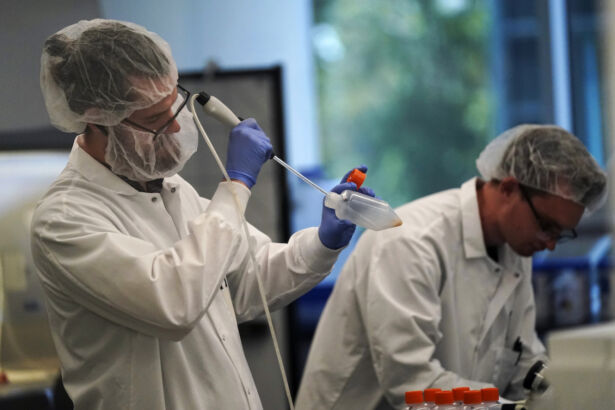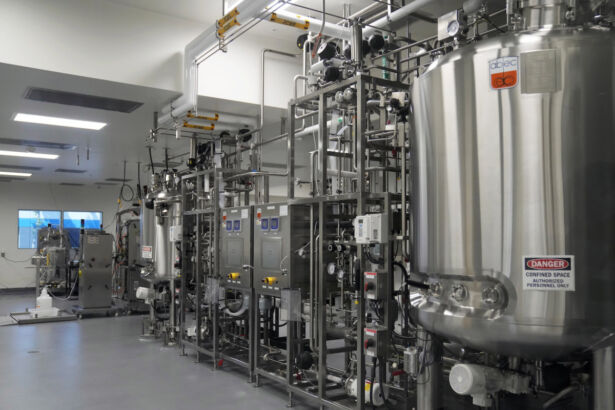U.S. regulators have approved the nation’s first lab-grown meat for sale—chicken products grown from animal cells.
The U.S. Agriculture Department (USDA) on Wednesday gave the OK for two California companies to sell their chicken products to restaurants, and eventually, supermarkets.
Startups Upside Foods, formerly known as Memphis Meats, and Good Meat, a subsidiary of Eat Just Inc., made announcements of their USDA approvals on Wednesday.
The USDA decisions mean that from now on, the agency will inspect the companies’ cultured meat facilities, just as it already does for regular meat processing plants.
The two companies plan to serve the new food first in exclusive restaurants. Upside Foods has partnered with a San Francisco restaurant called Bar Crenn, while Good Meat dishes will be served at a Washington, D.C., restaurant run by chef and owner Jose Andrés.
The companies and others like them say their new tech-enabled meat products will be able to feed humans without killing animals, and without the environmental impacts associated with grazing, growing feed for animals, and animal waste.
Cell Culture Technology and Concerns
Upside Foods and Good Meat sell what they refer to as “cultivated chicken” or “cultivated meat.” Their meat will be labeled as “cell-cultivated chicken” when sold to consumers.
Cell-cultivated meat—also known as cell-cultured meat, as well as cell-based or lab-grown protein—is made via animal cell culture technology.
It involves taking cells from a living animal, a fertilized animal egg, or a special bank of stored cells, and putting that into a culture medium so the cells can be fed. Some companies also use animal stem cells.

The medium is subsequently placed into large tanks known as bioreactors or cultivators, to help foster the cells’ growth. In the tanks is a broth-like mixture that includes the amino acids, fatty acids, sugars, salts, vitamins, and other elements cells need to grow.
Most forms of lab-grown meat, including that of Upside Foods and Good Meat, are made with “immortalized cell lines.”
The term refers to a population of cells that would normally not divide indefinitely but due to mutation, can keep undergoing cell division without end. The mutation may have taken place spontaneously or via intervention, such as exposure to radiation, genetic modification, or the use of an enzyme.
Upside Foods, in a submission to the FDA (pdf), said it “may use intrinsically immortal cells (e.g., stem cells)” or “uses well-established, safe methods to bioengineer the cells to intentionally delay senescence.”
The Center for Food Safety, a non-profit based in Washington, D.C., said in a blog in 2020 there are “several human health concerns” about genetically modified cell lines used in creating the meat products because “these lines exhibit the characteristics of a cancerous cell which include overgrowth of cells not attributed to the original characteristics of a population of cultured primary cells.”
Meanwhile, “[i]f they are using stem cells, cell-based meat companies need to pay attention to the risk of cancer cells emerging in their cultures,” the authors also wrote. They said Harvard researchers found that stem cell lines grown in a lab environment “often acquire mutations” in a gene that is “an important tumor suppressor responsible for controlling cell growth and division.”
“Their research suggests that inexpensive genetic sequencing technologies should be used by cell-based meat companies to screen for mutated cells in stem cell cultures so that these cultures can be excluded,” authors wrote.
In the case of Good Meat, cells are created from a master cell bank formed from a commercially available chicken cell line. The cells from the chicken cell line are “not recombinant or engineered (i.e., non-GMO) and have not been exposed to any viruses or viral DNA,” and also do not have “tumorigenic potential”—the ability to form tumors—the company said in a dossier (pdf) submitted to the FDA.
However, in the same document, Good Meat also notes that growth factors are used as part of its growth medium for the cells.

Upside Foods similarly described the use of growth factors to help culture the cells, although it notes in its submission to the FDA that all growth factors it uses in cultured meat production “are present in store-bought commercial chicken meat samples.”
The Center for Food Safety expressed concerns that the use of growth factors “could promote the development of cancer-like cells in lab-cultured ‘meat’ products,” and that “it is possible certain growth factors can be absorbed in the bloodstream after digestion.”
US 2nd Country to Approve ‘Lab-Grown’ Meat
With the latest USDA approvals, the United States is now the second country in the world to approve the sale of cultivated meat.
The two companies earlier received the green lights from the U.S. Food and Drug Administration (FDA), which determined the companies’ lab-grown meats are safe for human consumption.
Upside Foods received the FDA’s safety determination in November 2022, and Good Meat followed suit in March. Joinn Biologics, a manufacturing company that works with Good Meat, was also cleared to make the products.
Good Meat became the first company in December 2020 to sell its cultivated meat in the world—in Singapore, where its cultivated chicken is being served in select restaurants.

Both companies emphasized that initial production of its chicken products will be limited. Officials from Upside Foods told The Associated Press its facility can produce up to 50,000 pounds of cultivated meat products a year, and it aims to expand to 400,000 pounds per year. Meanwhile, Good Meat officials wouldn’t estimate a production goal.
By comparison, the United States produces about 50 billion pounds of chicken per year.
Globally, more than 150 companies are focusing on meat from cells, not only chicken but pork, lamb, fish, and beef.
Since 2019, the USDA and FDA have been collaborating on oversight over animal cell technology food products to ensure that any cultivated meats are properly labeled and deemed safe by the agencies.
The Associated Press contributed to this report.
Editor’s note: This article has been edited to provide additional information.
From The Epoch Times


